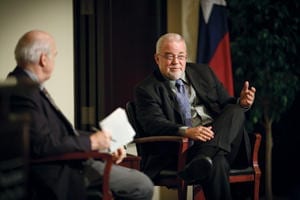
Bill Martin, the Baker Institute’s Harry and Hazel Chavanne Senior Fellow in Religion and Public Policy, left, and Rev. Jim Wallis, right, discuss the role of faith in public policy.
A little over a year ago, I walked into the Baker Institute for the first time as a matriculated freshman and attended my first Baker Institute Student Forum meeting. At that meeting, Rice alumna Lauren Baba, former BISF events committee chair and president, told all the new students that if we had an idea for an event or for a speaker, we could discuss it with her and try to implement it. At that time, I had recently re-read Rev. Jim Wallis‘ book, “God’s Politics: Why the Right Gets it Wrong and the Left Doesn’t Get It.” Rev. Wallis’ work has had a great impact on my political and religious thinking as I am proud, civically engaged liberal Democrat and a practicing Messianic Jew. The element of his work and life that has touched me the most, however, is his confident and bold assertion that one can be both liberal and have a meaningful and authentic Judeo-Christian faith. I grew up in a religious community where “liberal” was a dirty word, government an evil institution, and poverty was a problem for the poor to deal with. My immediate family, however, instilled in me that God does indeed care for the poor and calls us to use any and all instruments to support them and people of all races, classes and faiths.
After being at Rice for only a few weeks, it became very apparent to me that there is a great divide between the religious and the nonreligious and between the politically minded and the apolitical within the student body. I decided that Rev. Wallis, who is also the president and CEO of Sojourners, needed to speak on campus as a guest of the Baker Institute Student Forum. I thought he could do an incredible job of breaking down these barriers by showing that religion and politics, especially more progressive politics, are actually compatible and that no one has a monopoly on truth. Sojourners is a progressive Christian organization dedicated to social justice, and Rev. Wallis’ work on civil rights, apartheid and poverty reduction demonstrates the change that can occur when people work across religious and political lines.
Last week, more than 275 students, faculty and Houston community members gathered at the Baker Institute for a moderated discussion between Rev. Wallis and Dr. Bill Martin, the institute’s Harry and Hazel Chavanne Senior Fellow in Religion and Public Policy. The two men, both highly respected in their fields and the wider community, discussed the meaning and nature of social justice, the role of faith in public policy, and how American citizens can put pressure on the government to create change and to end poverty. Faculty, community members and students alike rose to their feet at the event’s conclusion and gave Rev. Wallis and Dr. Martin a standing ovation for their poignant and powerful words. The discussion was the largest Baker Institute Student Forum event in history, and person after person raved about how inspired they were by Rev. Wallis’ life, his work and his sentiments.
I could not have been happier with the event. The discussion between Dr. Martin and Rev. Wallis provided enough words of wisdom to consider for many nights, but the most validating aspect for me was the words of gratitude I heard from the students. All of the students I talked to expressed how inspired they were by Rev. Wallis. Some of them have decided to become more politically engaged and others have reevaluated how they view religious individuals. Rev. Wallis’ words have provided an opportunity for this campus to have a more honest and more tolerant discussion of faith and politics than ever before. I look forward to seeing where this new opportunity leads for Rice as a whole.
- View the video from and learn more about the Sept. 29, 2011, event “Forging a More Civil Democracy: A Discussion of Faith, Values and Politics.”
Danny Cohen is a Rice University sophomore majoring in political science and economics.